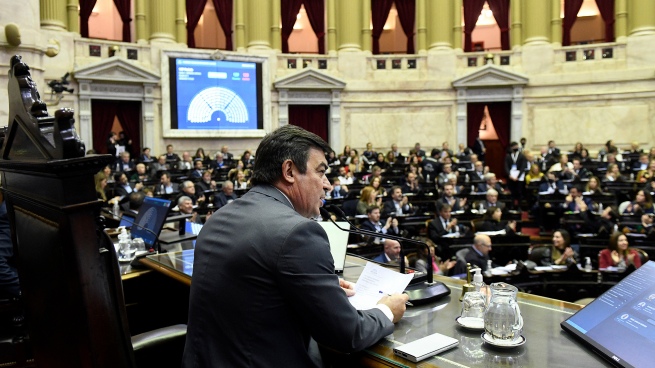The Chamber of Deputies approved this Wednesday night and sent to the Senate the bill promoted by Together for Change (JxC) and the Federal interblock to implement the Single Paper Ballot system in the presidential and legislative elections, which was voted negatively by the Front of All (FdT).
The project gathered 132 votes in favor, coming from the majority of the opposition arch; 104 negatives, from the Front of All and other allies; four abstentions, from the Left, and 15 absences.
At the beginning of the afternoon, the opposition managed to gather a strict quorum of 129 deputies with their own legislators, since the FdT had anticipated that it would not come down to the floor because it considered that it was an issue that is not on “the agenda of the people”.

The quorum was made up of 115 deputies from JxC -The president of the UCR bloc, Mario Negri, who suffers from coronavirus, was not present-, eight from the Federal Interblock, two from Together for Río Negro, two from Avanza Libertad, one from the Ser block and one from Libertad Avanza.
In the absence of the head of the Chamber of Deputies, Sergio Massa, who is part of the entourage that traveled with President Alberto Fernández to Los Angeles to attend the IX Summit of the Americas, the plenary was chaired by the vice president of the body, Omar De Marchi (PRO).
During the debate, the former Minister of the Interior and deputy of the Federal Interbloc Florencio Randazzo said that the current electoral system “it is reliable, but it is necessary to change the instrument”, because also for the theft of ballots “paid prosecutors are required, with which the political structures of those who are in government have an advantage in relation to those who do not have government management, and the single ballot comes to make up for these problems.”
The left-wing deputy Romina del Plá once again demanded “full financing from the State” and questioned the opinion promoted by opposition blocs because “it leaves a lot of resolutions of the Single Paper Ballot in the hands of the electoral judges, which generates a high degree of discretion and the full list vote is induced”.
For socialism, Enrique Estevez said that “this single ballot project comes to strengthen our democratic life, that of our institutions, and we want to value this idea of consensus and necessary dialogue in our country.”

The legislator of the Neuquén Popular Movement, Rolando Figueroa, indicated that he will vote in favor of the majority ruling promoted by the opposition because “we have always opposed the sheet lists, both horizontally and vertically,” but lamented that “there is still promoting the blanket list with the possibility of voting for the entire list and we hope that this point will be modified by the Senate”.
In turn, the deputy of Together for Río Negro Luis Di Giacomo assured that “the Single Paper Ballot is economically and environmentally an advantage. Many times they say that if a system works well it should not be changed, but it is true that democracy needs an improvement, and sometime we will go to the system of strikeouts or preference to no longer have the lists sheets”.
In the closing speeches, the president of the PRO bloc, Cristian Ritondo, stated: “We wanted the single ballot when we were the government and we want it now. The advantages of this new instrument undoubtedly reflect that it is more transparent, economical, ecological and It’s better for the people.”
From that same bloc, Silvia Lospennato warned: “After this very long process that takes several years, we may once again run into an official majority in the Senate that refuses to approve the single ballot. And it could happen that we manage to reach the long-awaited 37 votes in the Senate and that the president vetoes it.”
Paula Penacca, from the Front of All, expressed: “‘Do what I say but not what I do.'” If the Single Paper Ballot is so wonderful, why don’t they use it where they have governed for 15 years? The electoral system works: they want to fix what is not broken. But they have no interest in fixing what they broke when they ruled.”.
The radical Karina Banfi pointed out to those who did not support the sanction of the project: “Today there are going to be many of us who promote the law, and I have no doubt that there are more of us who agree than those who are going to vote.”
For the Civic Coalition, its head, Juan Manuel López, asserted: “This law will reduce the ‘drag’, the other side of that is that the citizen is empowered and will be able to ‘cut ballot’ more easily.”
In her turn, Graciela Camaño, from the Federal interbloc, asked her colleague from the Federal Meeting for help to unfold a ballot of more than 10 meters passing between the benches of other deputies.
“This is what we are going to vote for: that this number of people, of ballots and of electoral confusion contribute to the fact that the citizen does not have the possibility of choosing”he explained while unrolling that collage with the electoral offers that took place in the last election in the Buenos Aires municipality of Moreno.
Faced with this staging, the president of the ruling bloc, Germán Martínez, clarified: “We can be successful or not within normal terms,” referring to the models of supposedly unique ballots that members of his caucus previously exhibited.

“As they applauded and put together an entire act around Moreno’s alleged ballot, which did not exist, I have to clarify that it is a composition of practical work that my son could have done,” he asserted.
Finally, he completed: “We want to continue strengthening the interests of the Argentine people, and we are going to do that guided by the best background that the national and popular field has, no matter what political party they belonged to.”
Negri, through a statement, lamented his absence due to Covid: “I have been one of the first promoters of this issue, I always defended greater transparency in electoral processes to strengthen democracy. That is why I very much regret not being able to vote for the half sanction of this important project that reaches the venue thanks to the joint work of practically the entire opposition.
The project establishes that the Single Paper Ballot system will be applied for PASO and general elections to elect president, vice president, senators, deputies and legislators of Mercosur, although in these last two categories only names and photos of the first five candidates will appear. .
In addition, it will be allowed to vote the complete list and use, if authorized by the provincial electoral system, the BUP scheme, but it must be done in separate ballots and ballot box; and voting by email will be authorized for foreigners, which was applied until 2019.
The ruling party’s rejection of the project was also highlighted during the presentations of the officials of the Executive Power who spoke during the debate in commissions.
The Secretary for Political Affairs of the Ministry of the Interior, Patricia García Blanco, assured that “since 1983 to date, the elections take place with total normality and there have been no complaints”; She said that the system “has given peaceful alternation to the different forces” and considered that with the proposals to change the system “the legitimacy of all the elected officials is called into question.”
















